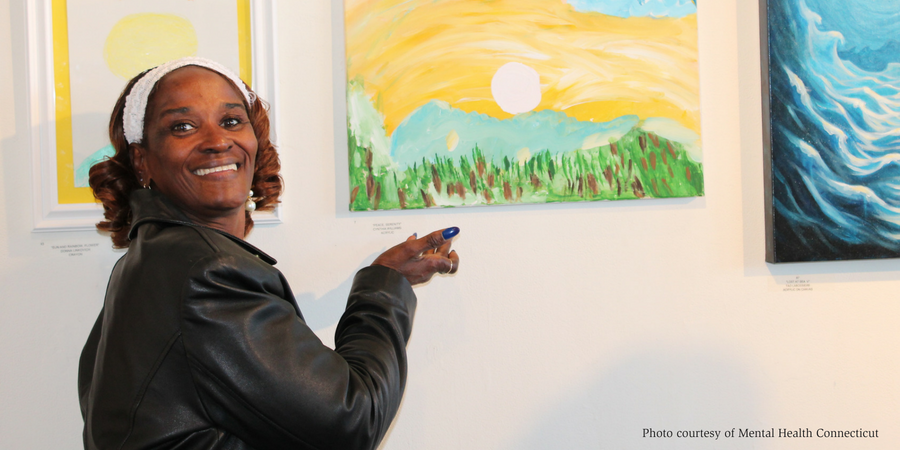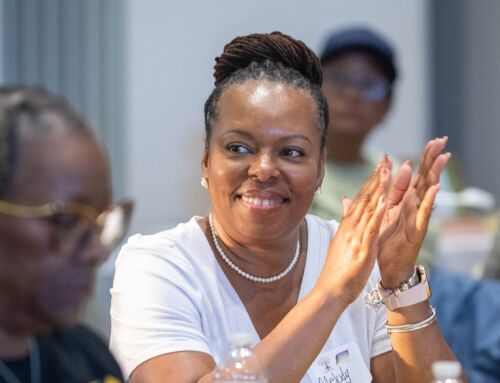
An art show would seem to be the last thing on someone’s mind when departing the confines of a mental health treatment center after weeks or months.
Leaving inpatient treatment can open doors to challenges bred by prolonged battles with addiction, bipolar disorder, depression or schizophrenia: wounded self-esteem, finances and relationships and a tenuous grip on a place to live or work.
The next stop for many people is often Mental Health Connecticut’s (MHC) Independence Center in Waterbury, where encouragement and wisdom are woven into housing and assistance programs that promote four pillars of recovery—home, health, purpose and community.
The Center compassionately offers all those things, plus one more lifeline—the Mending Art program—made possible by Connecticut Community Foundation donors. It’s a safe space to creatively express the tangle of emotions or traumatic experiences that frequently impede recovery.
Coordinator Amy Smith, an accomplished artist in her own right, is the gentle and trusted coach for Mending Art. She often begins by simply extending an invitation for new attendees of the Center to enter a studio stocked cheerfully with paints, canvases and art supplies.
What happens after that has been nothing short of astounding.
Says Smith, “A lot of our artists are really hard on themselves. But when they start drawing or creating and hearing the positive words, they start seeing themselves a bit differently.”
In the artists’ words:
“The painting helps me let go. It brings out the inner beauty in me and I see the beauty of others when I look at their art.” (Jeannette S.)
“Art helps me acknowledge that I am somebody.” (David G.)
“Drawing has helped me through some of the darkest and happiest times of my life…” (Jennifer F.)
In 2017, Mending Art went on the road. Over 60 artists exhibited their work at ArtSpace Hartford. Other works were displayed at area libraries, senior centers, the Mattatuck Museum, Waterbury City Hall, the Boys and Girls Club of Greater Waterbury, and Western Connecticut Mental Health Network’s Create Art Show and Sale.
One artist, Robin Laganza Lindstrom, even published her own children’s book, Lucy and Ben, about two children who live with a mom who has bipolar disorder.
Through community exhibits, Smith said, artists “feel like they are being seen for themselves, not their illnesses…and it gives them so much confi
In 2017, more than 120 people used Mending Art to heal from illness or trauma and to build social connections.
Connecticut Community Foundation’s funding over the past two years has been critical, particularly as MHC labors to help growing numbers of young people and older adults who seek their services.
Still, they point to success stories like Cynthia W.’s.
Cynthia began with tentative drawings in a sketchbook, but was soon painting “constantly” in the Mending Art studio. She has since moved to New Jersey, in part because she was offered an opportunity there to lead an art program.
“I’m stepping into my place and art is it,” she said. “It doesn’t have to look like anyone else’s because it’s mine.”
Photo: Cynthia W., with her painting titled, “Peace, Serenity” at Mental Health Connecticut’s Mending Art exhibit at Hartford ArtSpace Gallery







